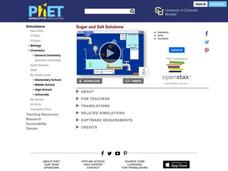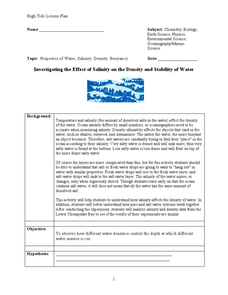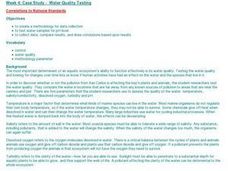Chymist
The Solubility of a Salt in Water at Various Temperatures
An educational lesson allows young chemists to test the solubility of different types of salt at various temperatures. Groups create a graph using data from unsaturated, saturated, and supersaturated solutions.
American Chemical Society
Why Does Water Dissolve Salt?
Individuals explore solubility by modeling how water dissolves salts. They then view a video and compare how well water and alcohol dissolve salts, relating their comparisons to the structure of each molecule.
Curated OER
The Water Cycle
Observe the stages of the water cycle by completing 3 activities. To help understanding of the water cycle your students can observe evaporation, the formation of frost, vapor and water and the process of distillation which is used to...
American Chemical Society
Dissolving and Back Again
From solid to liquid and then back again. Young scientists dissolve salt in water and then evaporate the water while observing what happens to the solute. They use their observations to make predictions about other solutions.
Curated OER
MEASURING THE DENSITY OF WATER
Students perform an experiment to measure the density of tap water vs. salt water.
Curated OER
Salt Marsh in a Pan
Students create a model of a salt marsh to discover the impact of pollution and human activities on water-based habitats including bays and the ocean. They recognize the relationship between natural and developed areas. Students impact...
PhET
Sugar and Salt Solutions
Ionic bonds form from electrostatic energy, allowing for higher conductivity than those seen in covalent bonds. In the simulation, learners add sugar and salt to water and see the effects on concentration and conductivity of their...
American Chemical Society
Does Temperature Affect Dissolving?
When making sweet tea, why do people dissolve the sugar in hot tea instead of cold tea? The class discusses the previous lab and builds upon it. Working in groups, they design an experiment to determine how temperature affects the...
Chymist
Testing the Waters
Should you trust the water you drink every day? The hands-on activity has scholars test water from different sources for contaminants. Pupils perform chemical testing and make conclusions about pH, hardness, iron, chlorine, lead, and...
American Chemical Society
Using Dissolving to Identify an Unknown
There is a solvent called aqua regis that can dissolve gold! After observing a solubility demonstration, groups receive four known crystals and one unknown. Based on the demo, they design an experiment to determine the identity of the...
Curated OER
The Effect of Dissolved Salt on the Boiling Point of Water
Explore the properties of solutions with a lab activity. Chemistry fans determine the boiling point of water, add salt to create a solution, and then repeat the process four more times. They design their own data table and then graph the...
NOAA
Please Pass the Salt
Salinity is the focus of two experimenters that work to answer the question, How does salt change the physical properties of water? Super scientists compare the freezing rate of salt and fresh water, combine the two waters to observe how...
Curated OER
Mixing Dissolving Quiz
Answer true or false to get through this 11 question quiz on mixing and dissolving. Budding chemists who know their stuff will have no problem determining which dissolving and mixing questions are correct. A basic quiz on the basic...
Curated OER
How Soluble Is It?
Is sugar more soluble than salt? Experiment with water and solubility with an elementary science activity. After interpreting data from a bar chart, fifth graders use different types of sugar to determine if the size of sugar particles...
Curated OER
Water Pressure in the Ocean
Students compare the pressure of water at different depths and gain an understanding of how increased water might affect animals living in deeper waters. They participate in an experiment to show that depth, not volume, affects water...
Cornell University
Energy Changes in Chemical Reactions
The heat of solution measures how much thermal energy a dissolving substance consumes or gives off. The experiment demonstrates both endothermic and exothermic reactions. Scholars dissolve several substances, measure the temperature...
Curated OER
Investigating the Effect of Salinity on the Density and Stability of Water
Water with varying amounts of dissolved salt are dyed and then used to compare densities. The objective is to discover the effect of salinity, and therefore density, on ocean water on the stability of the ocean. Many branches of science...
Curated OER
How Does Water Cool?
How fast does water cool? First fifth graders will draw a line on a graph that predicts how fast they think water can cool from boiling. Then they plot the actual data on the same graph to see if their estimate was correct.
Curated OER
What Are The Properties of Sea Water?
Ninth graders conduct research on the subject of sea water. They use a variety of resources to obtain information. There are helpful resource links listed in the lesson plan. In conjunction with the research students make inquiry of the...
Curated OER
Surface Water and Groundwater
Students examine distribution of water and minerals. In this surface and groundwater lesson, students conduct an experiment with fresh and salt water making hypothesis and drawing conclusions about minerals.
Curated OER
Water Quality Testing
Student explore factors affecting ecosystems. They test local water samples for pH level. After creating a methodology for data collection, they collect data, compare results, and draw conclusions based upon results.
Curated OER
Salts
In this acid and base learning exercise students complete a chart then answer a series of questions on how acidic and basic different solutions are.
Curated OER
Acids, Bases and Salts
In this acids, bases and salts worksheet, students solve five problems in order to determine the molarity of solutions or the volume of substances to be added to make molar solutions. They also solve five dilution problems about acids.
Curated OER
WS 10.10 Salts and Buffers
In this salts and buffers activity, students answer five questions about the acids and bases that form salts as well as the equations for a buffer system.

























